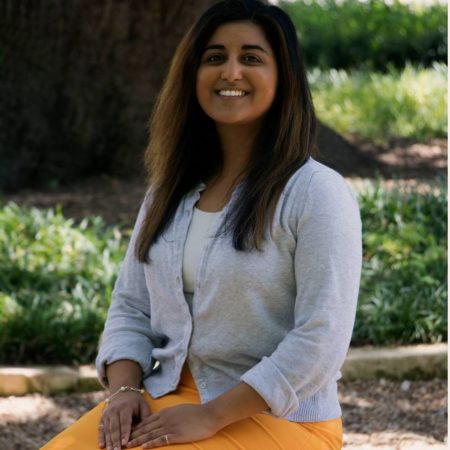As the event director for ATX Hack for Change, Sarah Sharif brings her passion for innovation and giving back by solving some of society’s biggest problems.
By Danielle Ransom, Photo courtesy of Sarah Sharif
For Sarah Sharif, the call to make a difference never rings louder than when she’s giving back to her community, whether its raising funds for a crocodile she met volunteering at a London zoo as a child to starting a rainforest club. Austin Woman met up with Sharif to learn how ATX Hack for Change is using civic hacking to solve community issues, one line of code at a time.
Now at the helm at one of Texas’ largest nonprofit hackathons, the 27-year-old is all about discovering the latest innovations to some of society’s biggest problems.
Sharif first got involved with ATX Hack for Change when she was hired on as an IT project manager and communication strategist at St. Edward’s University in 2015 when a colleague introduced her to their sponsored annual hackathon. The possibility of building a civic hacking model that could scale not only in Austin, but could also have a positive impact in other states and countries lured her in.
As the event director over Hack for Change, Sharif oversees dozens of projects during their annual 3-day hackathon, helping teams improve their elevator pitches for potential clients, identifying project needs or roadblocks and troubleshooting any other problems groups may face.
 It’s hard to imagine that three years ago this event was nowhere near as large as it is today. When Sharif came onboard, ATX Hack for Change resembled more of a small side project struggling to garner interest and in dire need of an image overhaul, than a highly impactful community institution.
It’s hard to imagine that three years ago this event was nowhere near as large as it is today. When Sharif came onboard, ATX Hack for Change resembled more of a small side project struggling to garner interest and in dire need of an image overhaul, than a highly impactful community institution.
After rebranding the entire event to fit Austin’s reputation as a city of innovation, Sharif and her team developed a partnership with Google Fiber that helped establish a base for their yearly event. This methodical revamping of ATX Hack for Change is finally coming to fruition as more outside sponsors are taking interest in the budding nonprofit.
Case in point: The City of Austin launched a new grant competition, the Gigabit Fund Competition, putting $38,000 in prize money up for grabs toward apps, prototypes or products related to public health, education, clean energy and public safety at this year’s hackathon.
Sharif’s ambition to build a more connected community didn’t end there. She developed a series of “101” workshops breaking down common hackathon concepts that were a total hit this year after piloting them last year. The long-term goal is to eventually hold events like this more frequently throughout the year for attendees to stay connected and draw in newcomers.
As for what’s next, she is currently eyeing collaborations with the Dell Medical School and Under Armour to give innovators the opportunity to work with the latest technology in healthcare and fitness.
Sharif credits the examples set by her parents and grandmother growing up for instilling a genuine desire to give back, witnessing first-hand the impact her grandmother had in their homeland Pakistan where she ran an Old Girls School.
Another moment that further solidified her need to work for the social good of others came right after Sharif graduated college in 2012 and took the first job to come her way, a finance job in San Francisco, to a payoff student loans.
“I [will never]be in a position [again]where I’m not feeling passionate about what I am doing. It was kind of that pivot moment of “I have to change everything,” says Sharif regarding her decision to move to Austin on a whim with no job or prospects lined up after quitting her first job.
She got her first job in Austin as an apprentice for the Sierra Club before being promoted to a conservation organizer managing environmental campaigns but ultimately decided to move into a position that would enable her to impact more people on a wider scale.
“While the environment is important to me, [there are]so many issues that I can impact if I start scaling upwards,” says Sharif.
From raising awareness for domestic abuse to supporting beekeeping communities to using virtual reality for veterans suffering from PTSD anxiety, Sharif is working to not only solve local issues but to place the event into the global community to increase the number of lives impacted and give innovators the opportunity to collaborate.
Despite running around with a full plate between her full-time job and volunteer work, Sharif combined her skillset and experience to start her own consultancy, Civic Ventures, where she will help interested parties develop business strategies and plans for socially-conscious civic projects. She’s already nabbed her first client, Lafayette College, and is currently in discussion with a potential client from the Netherlands after officially getting her business off the ground and fully operational in two months.
“I think of technology as that missing ingredient we’ve never had before. Austin is front and center [in patient care],” says Sharif. “I think that could be a true space of innovation that Austin could lead it [and]tapping into that could be powerful.”
